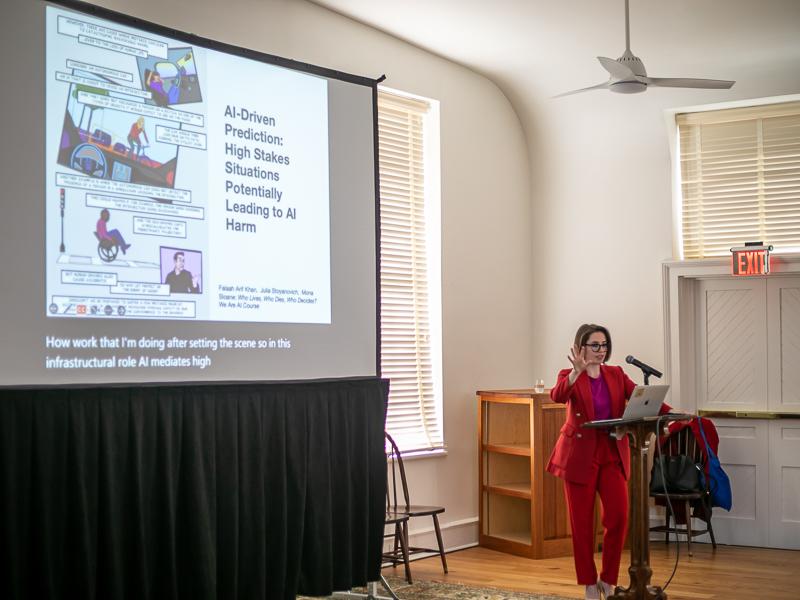The Future is Now: AI Expert Launches Speaker Series Exploring How Technology Is Reshaping Higher Education

The impact of recent developments in Artificial Intelligence on the worldwide workforce and on higher education, could be “Enormous and frightening…[with] the potential to displace humans from whole categories of knowledge work,” technology columnist and president of Southern New Hampshire University Paul LeBlanc wrote in a recent article for Inside Higher Education.
The artificial intelligence chatbot ChatGPT, launched in November of 2022 and capable of generating detailed and sophisticated responses to questions on a wide range of subjects almost instantly, and DALLE.E 2, which uses deep-learning models to generate images from simple text, have intensified the discussion in higher education about the role of AI as a producer of knowledge, according to Philip E. Bourne, Stephenson Dean of UVA’s School of Data Science and professor of biomedical engineering.
“AI has gone from novelty to disruptor in a very short period, and university leaders are now paying attention and concerned about what is to come,” Bourne said.
“There is complexity and urgency to the issues we face today, and these massive changes are global in scale,” said Christa Acampora, Buckner W. Clay Professor of Philosophy and Dean of the College of Arts & Sciences. “Clearly the explosion of data and artificial intelligence is already transforming the world of work as well as higher education and many dimensions of our social lives, making these discussions vital, not just for the moment we’re in but for our future and the future of our students.”
In order to address the more immediate implications of AI’s impact on issues like academic integrity and its long-term effect on how educators will need to begin thinking about preparing students for a world of work that may soon be profoundly changed, UVA’s College and Graduate School of Arts & Sciences in partnership with the UVA School of Data Science launched the speaker series “AI and Society,” on March 14. The inaugural lecture was given by sociologist Mona Sloane, senior research scientist with the NYU Center for Responsible AI, whose work focuses on ethics in AI design and policy and who was recently added to the 100 Brilliant Women in AI Ethics Hall of Fame.
Sloane spoke to students, faculty and UVA leaders on the subject of AI and the organization of social life, detailing a number of ways that AI is already deeply embedded in the relationships that humans have with one another.
“At this point it has become integral to how we organize society, from culture to consumption, to global supply chains and trading, to our organizations and the processes that make them more efficient,” Sloane said.
What we call AI, Sloane explained, is an umbrella term that includes a variety of systems that we are both using and co-producing every day as we shape the function and effectiveness of features like autocorrect on our phones and computers, as we engage with the technology that suggests products we might like to buy and learns each time we act on those recommendations, and as we engage with voice assistants like Siri or Alexa that are learning to detect patterns in our behavior.
Systems with the same capacity to learn, Sloane explained, are playing a growing role in processes that make business and bureaucracies more efficient and more productive by reducing or eliminating the need for human judgment in the marketplace, in our safety and security systems and other complex aspects of our cultural infrastructure that require complex decision making.
Sloane also discussed the issue of “AI harms,” or the problems created when these types of systems create inequities that affect a subset of the population or withhold opportunities or resources from certain individuals. She noted the need for new policy at the state and local levels to regulate the use and development of AI, but she also called attention to the efforts of technology companies to address those issues through culture change and self-governance measures that include developing codes of conduct, industry standards, privacy policies and efforts to maintain transparency, and she noted the dramatic growth in the field of AI ethics over just the last few years.
Pointing to several recent policy initiatives, Sloan called attention to the role AI is increasingly playing in the work of human-resource professionals and how that will directly impact new generations of job seekers and the decisions they make about preparing themselves for their careers. She also discussed her current research that involves understanding the interconnected recruiting systems that employers use, which play a growing role in shaping the world’s workforce and assessing the value of those looking for a way to join it.
“For those of us in the data science business, these developments are no surprise, but they do present us with an opportunity to be active rather than reactive,” Bourne said. “That is, rather than respond to what has happened already, we need to ascertain what is coming and get out in front of it, to predict what will happen in the next 5-10 years and to build for what is to come starting today.”
“AI is changing the way we discover, create and learn. We will see its impact in research, discovery and creative expression; it will transform the how and what of teaching and learning," Acampora said. "I am truly grateful for the partnership with Dean Bourne. I’m looking forward to exploring more through this series and to tapping the expertise of our colleagues in Arts & Sciences and across Grounds.”




